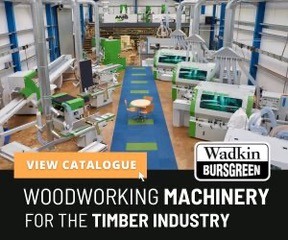Some of the world’s leading retailers are in advanced talks with a company behind a world-first technology to recycle MDF waste.
The interest in MDF Recovery’s recycling solution follows the successful conclusion of proof of concept trials to develop a commercially-viable process to recover wood fibre from used or off-cuts of MDF to offer the first ever alternative to landfilling or incinerating MDF as part of an energy recovery solution for leftover MDF.
North Wales-based MDF Recovery recently received a £250,000 investment from SUEZ Recycling and Recovery UK, one of the UK’s leading recycling and resource management organisations. It has also been funded by Innovate UK and a group of angel investors.
MDF Recovery is now talking to leading retailers and MDF manufacturers about potential partnerships as the business prepares to take its proprietary technology to the commercial market after more than six years of research and development.
MDF as a material was first introduced in the 1970s and today more than 50 million tonnes are produced globally every year, servicing the furniture, construction and DIY markets.
Craig Bartlett, co-founder and managing director of MDF Recovery, said: “We are in talks with some of the world’s biggest retailers about harnessing our technology’s capabilities in their organisations. Sustainability is right at the top of the retail agenda and our solution offers retailers and MDF manufacturers a genuine world first. Refurbishment and fit out inevitably result in tons of material heading for landfill. Increasingly, retailers are aiming to reduce their environmental impact by using a larger percentage of recycled materials in their outlets.
“For furniture manufacturers, shaping and finishing MDF creates waste. Over 20% of MDF is wasted during the production of MDF sheets.”
Stuart Hayward-Higham, SUEZ technical development director, said: “We are delighted to make this investment to continue assisting with the development of MDF Recovery’s ground-breaking technology. The technology should literally give a new prolonged shelf-life for MDF, one of the most popular materials across the construction and furniture industry from large scale commercial projects to the army of shelf-fitters and DIY carpenters up and down the country. Zero waste production for the wood component of MDF is now a real possibility. This is the perfect fit with SUEZ’s commitment to delivering practical, environmentally-responsible and innovative waste management solutions.”
The recovered fibre produced by the process is of the same high quality as fibre obtained from virgin wood and can be used as a direct substitute in the manufacturing process. The MDF Recovery technology can be retro-fitted or designed into new manufacturing plants and offers a robust solution for reworking waste and increasing the yield at the MDF manufacturing facility.
Principal markets for MDF include the UK, Continental Europe, USA, Russia, Brazil and China. Demand for MDF products is increasing in Eastern Europe and Asia.
MDF Recovery’s solution generates a new secondary material source for the wood/natural fibre industry that displaces the need for new virgin materials and comes at a time when demand for virgin timber from many other sources is growing.
SUEZ and MDF Recovery have previously collaborated on an Innovate UK project within its Supply Chain Innovation towards a Circular Economy competition. The project focussed on introducing a closed loop recycling option for waste MDF, allowing manufacturers to take back material from their customers. A pilot plant was established and is currently being used to optimise the process and host demonstrations for industrial end-users.
Before establishing MDF Recovery in 2009 with co-founder Jim New, Craig worked as head of research & consultancy at the UK Furniture Industry Research Association (FIRA), developing a wide range of technological solutions in partnership with industry and academia.
MDF Recovery has an Advisory Panel which includes Geoff Rhodes, a former President of the Timber Trade Federation (TTF), the European Association of MDF Manufacturers (EMB) and the Fibre Building Board Federation (FIDOR).
Other panel members include Dr Knut Kappenberg, a former Global R&D manager at Sonae Industria, one of the largest global manufacturers of wood-based panel products, Dr Rob Elias, director of the BioComposites Centre (BC) at Bangor University and experienced CEO and business advisor Ray Howard.








